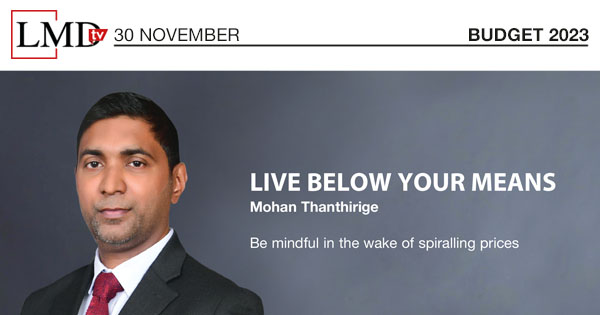On a recent edition of LMDtv, the Group Financial Controller and Senior Vice President of John Keells Holdings (JKH) Mohan Thanthirige stressed the need for policy consistency to implement the provisions outlined in Budget 2023 – and he called for frugality among individuals to brave the economic crisis.
Sharing his views on whether the budget sufficiently addresses and facilitates the formulation of a framework to demonstrate Sri Lanka’s alignment with the IMF’s proposals, which are pending finalisation, Thanthirige highlighted two of its key goals – viz. an increase in government reviews and a deceleration of economic activity.
Against this backdrop, he pointed out that policy consistency is crucial to showcase the island’s resilience, and create a positive environment for foreign investors to set up facilities here.
“Investors will look for several things such as skilled labour, a continuous supply of power and energy, and tax holidays to name a few; but policy consistency is key,” he explained.
From a cash flow management perspective and considering the macro economy, he urged Sri Lankans to manage their personal budgets and cash flows in order to maintain healthy liquidity levels.
He asserted: “The current issue is liquidity, regardless of whether you are an individual, a bank or a company; therefore, preserving cash is important.”
According to Thanthirige, simple steps like developing the saving habit need to be taken and inculcated, regardless of the amount being saved. He said: “Have a tab on your expenses so that when you are comparing your expenses from one month to the next, you can make decisions on where to cut [your expenditure].”
His mantra is to “live below your means. With these price escalations, you have to be mindful. Unless you’re born with a silver spoon in your mouth, it’s better to deposit something in an asset [based] product.” And he cited a housing loan as one example.
“Although it sounds controversial to try to live below your means, you need to own an asset. For instance, if you obtain a loan and build a house, when there are price increases and inflation, your asset also increases in value, he elaborated.
Thanthirige also recommended that the younger generation embraces insurance programmes as soon as possible “without waiting till you reach a certain age.”
And he explained that “if you wait till you’re 30 or 40, prices may escalate. We don’t know what’s going to happen tomorrow – so act now. Think about starting early when it comes to life insurance and make use of low premiums.”
In the context of the new tax regime – and encouraging more people to fall in line with the new tax system voluntarily – he emphasised that accountability, responsibility and transparency will ensure that people come on board.
“If you can bring in transparency, as law abiding citizens, people won’t mind registering for the new tax regime because they know that their money is being put into the development of the country,” he averred.
He also pointed out that “accountability, responsibility and transparency are key things that shareholders look for when investing in our country. In a similar way, even in the case of individuals paying government taxes, people need to ask for accountability from the people who are handling their money. They need to ask the right questions – is the government responsible for the money that it is receiving from the people in this country? We need to ensure that people are asking these questions in public.”
Thanthirige urged individuals, businesses and communities to collaborate: “When you want to propose a change, it’s better to work in unison. So sit with your competition, sit with those in your value chain and work together with greater collectivity. Work in collaboration to create a single voice.”
“It is only then that that voice and message can be taken to greater heights,” he concluded.





